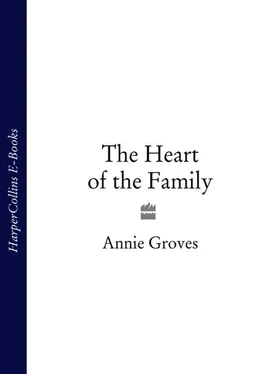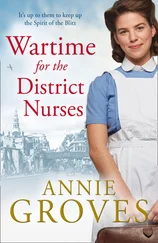Charlie could think of any number of people who’d no doubt be only too happy to acquire it, if only to sell it on through the black market, but of course he had known better than to say so to his mother, who wasn’t renowned for the acuteness of her sense of humour.
Without anything having to be said, the more senior of the trainee nurses such as Grace had taken it upon themselves to go in turn with those patients who, because of the severity of their wounds, were not only bed bound but also could only be moved very slowly.
Tonight it was Grace’s turn. She had seen the brisk nod of approval that Sister had given her when she had come quietly to the bed holding the most seriously injured of all their patients, a young soldier who had been caught in a blast from an unexploded bomb. His face and head were heavily bandaged. It was a miracle, according to the doctors, that he was still alive. Grace, who had been on duty the night he had come out of the morphine he had been given and who had heard him screaming in agony and then begging for death, found it hard to think there was anything miraculous about what he was having to suffer.
He couldn’t survive, they all knew that, and for that reason if no other they were all taking extra care to ensure that the fact that he was still alive was respected and that he was treated exactly the same as those patients who would survive.
Hannah, Grace’s closest friend from their original training set, had told Grace bluntly that had she been someone who loved him she would have been tempted to place a pillow over the bandaged face to ease his agony for ever.
As Grace and one of the porters slowly pushed his bed towards the exit, a bomb exploded close at hand, causing the patient’s body to contort in agonised fear. Automatically Grace reached for his hand to comfort him, holding it in her own.
Just as it had once seemed unbelievable that something like this could happen, now it seemed equally impossible that it would ever cease. The worst of the debris caused from Saturday night’s bombing had been cleared away but the scarred seared wall of the courtyard where so many had died, caught in the bomb blast, still stood as a stark reminder of the frailty of life. The patient, who had been trembling convulsively, suddenly went still, the grip of his hand slackening.
They were still several yards from safety and the shelter, but Grace realised she had something far more important to deal with now than her own safety.
Bending towards the bed, she told the porter quietly, ‘I think we need the padre, if you can find him for me, please, John.’
They said that you always remembered your first death, but for Grace each one brought her that same sense of loss and pain, and that wish that things could be different and that her patient might live.
What was easier now, though, was to hold tightly to the slackened hand and quietly recite the words of the Lord’s Prayer. Sister, in that calm all-seeing way of hers that Grace so admired, seemed to materialise on the opposite side of the bed out of nowhere, her own hands competent and professional as she reached for the dying man’s other hand, checking his pulse against her watch, then talking quietly to him once Grace had finished her prayer.
He had gone before the padre managed to reach them, but the formalities of respect had still to be gone through, the blessing said, and a doctor summoned, a space found for the ritual and respect accorded to the newly dead even in the midst of a bombing raid that could take their own lives at any minute. A well-trained nurse did not abandon her patient to protect her own safety.
Grace waited until the doctor gave the brief nod of his head that signalled that the body was to be taken to the morgue before accepting her own dismissal from Sister and continuing on her way to the shelter.
It was three o’clock. Her eyes felt dry and gritty from smoke, brick dust and uncried tears. When this war was over she would cry an ocean of them, but not now – not when, as their vicar had said from the pulpit on Sunday morning, with every strong heartbeat of hope and courage and the belief that they would prevail they were driving back the enemy, just as with every weak heartbeat of fear they were inviting defeat.
Now instead of thinking about the bombs and worrying about her own danger, she would think instead of Seb and how much she loved him. Like her, Seb was on duty tonight. He was based at Derby House, down near the docks. They tried to time their off-duty hours so that they could be together if at all possible. Nurses weren’t allowed to wear engagement rings, so Grace kept hers hidden, wearing it on a fine chain beneath her uniform. When she felt afraid, like she did now, just knowing that it was there and that Seb loved her was enough to calm those fears.
The air-raid shelter was crowded, but a nurse whom she vaguely recognised shuffled along to make room for her, welcoming her with a tired smile.
None of them had taken her full off-duty hours, snatching a few hours of sleep instead and then going back to work, knowing how desperately her skills were needed.
The remorseless throb of aircraft engines overhead made Grace want to cover her ears. They couldn’t go on like this much longer, being attacked night after night, everyone said so, talking about the effect the unrelenting attacks were having on people’s morale in low hesitant whispers. The unthinkable, the unbearable, had begun to drift into people’s minds, obscuring hope in the same way that the smoke-and dust-filled air was obscuring the sky.
‘Lord knows where we’re going to put them as gets injured tonight,’ the other nurse sighed wearily. ‘The whole hospital’s already bursting at the seams.’
Grace nodded. It was true, after all. Patients were already having to lie on makeshift beds in corridors. The operating theatres were working at full capacity, with extra surgeons coming in from surrounding towns, including Manchester, and now the staff were facing shortages of supplies, the hospital authorities unable to restock fast enough to cope with the demand. Some patients, like the boy who had died earlier, were so badly injured that there was nothing that could be done for them other than to try to relieve their pain, and even that wasn’t always possible. Word had gone round on the grapevine when Grace had been in the dining room earlier that with the city almost cut off from the rest of the country, morphine was to be kept for those patients who could survive and not given as palliative care to those who would not, for fear of the supply running out.
War was such a cruel thing, its horrors thankfully unimaginable to those who had not experienced them. Grace had seen people whose bodies were so badly damaged that if anyone had told her three years ago about such injuries she would have thought they were trying to frighten her.
She closed her eyes, trying to blot out the sound of the continuous waves of incoming bombers and focus instead on the bursts of gunfire from the ack-ack guns. How much longer could Liverpool survive such an onslaught? Not much longer, she suspected. The Germans were bombing the heart out of the city and its people, destroying its buildings, smashing its infrastructure, maiming and killing its people, knowing how much the whole country depended on the vital necessities – raw materials and foodstuffs – that those Merchant Navy convoys whose port was Liverpool struggled to bring in from across the Atlantic.
Cutting off that vital lifeline would be like cutting off the flow of blood to a patient’s heart – and only death could follow.
Down in the protected underground buildings beneath Derby House, Seb couldn’t help worrying about Grace. He loved her so much and she was so very brave, as he already had good cause to know, never flinching from putting the safety of her patients first.
Читать дальше












